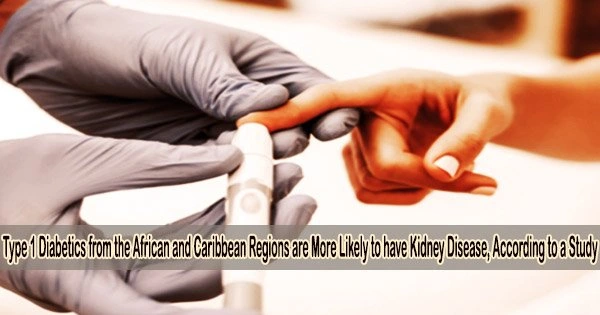Type 1 diabetes, also known as juvenile diabetes or insulin-dependent diabetes, is a chronic condition characterized by the inability of the pancreas to produce enough or any insulin. Type 1 diabetes typically develops in childhood or early adulthood, although it can occur at any age. Its onset is often sudden, with symptoms appearing rapidly over a short period of time.
For the first time, new research has established that ethnicity is a risk factor for kidney disease in persons with Type 1 diabetes.
Researchers from King’s College London published the study, one of the largest of its kind, today in Diabetes Care. Additionally, the research indicates that those with diabetes and African-Caribbean ancestry have a 60% higher risk of developing severe kidney disease.
Type 1 diabetes is an autoimmune condition that can cause symptoms early in life. Type 2 diabetes is often lifestyle-related and can develop over time. There are 400,000 people living with type 1 diabetes in the UK, which affects an estimated 10% of people with diabetes. No matter what type of diabetes a person has, kidney damage affects between 30 and 40% of them.
Diabetes-related kidney failure is devastating for people affected and their families. This is the first study in type 1 diabetes to describe the impact of ethnicity on kidney function loss. We observed that African-Caribbean people with type 1 diabetes are at nearly 60% higher risk of losing more than half of their kidney function and that this loss also occurs faster. Further studies are needed to study and understand the exact reasons for this increased risk of kidney disease in African-Caribbean people with type 1 diabetes.
Dr. Janaka Karalliedde
While ethnicity is known to increase the risk of type 2 diabetes and kidney disease, it is less clear whether ethnicity increases the risk of type 1 diabetes’s kidney problems. The majority of the research on kidney disease risk factors was conducted in less diversified or predominately Caucasian cohorts.
Researchers from King’s College London looked at more than 5,000 people with type 1 diabetes. All people in this cohort had good kidney function and 13% were African-Caribbean.
Eight years of follow-up revealed that 260 persons had developed stage 4 renal disease, which is a sign of severe and advanced kidney disease, and had experienced a decline in kidney function of more than 50%. Stage 5 is kidney failure when people often need a kidney transplant or dialysis to live.
Findings reveal that this higher risk for African-Caribbeans is not related to other kidney disease risk factors that are known to raise it, like high blood pressure or poor glucose control.
Lead author Dr. Janaka Karalliedde, from King’s College London, said: “Diabetes-related kidney failure is devastating for people affected and their families. This is the first study in type 1 diabetes to describe the impact of ethnicity on kidney function loss. We observed that African-Caribbean people with type 1 diabetes are at nearly 60% higher risk of losing more than half of their kidney function and that this loss also occurs faster. Further studies are needed to study and understand the exact reasons for this increased risk of kidney disease in African-Caribbean people with type 1 diabetes.”
Hilary Nathan, Director of Policy and Communications at JDRF UK: “This is important research, showing for the first time that people of African-Caribbean heritage have a far higher risk of developing kidney disease because of type 1 diabetes. This research area needs greater funding and focus to help form future approaches to genuinely personalised medicine, so that people from African-Caribbean backgrounds with type 1 diabetes do not have to face undue fear or consequences of traumatic kidney function loss. The study was supported by a research grant from Guy’s and St Thomas Hospital Charity.”
















